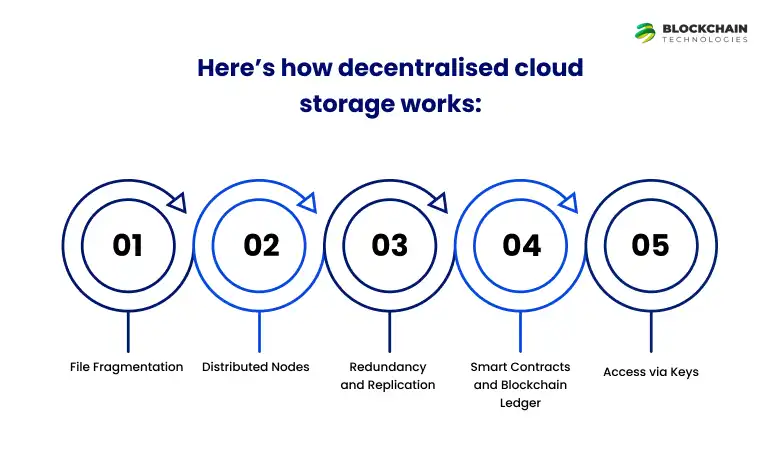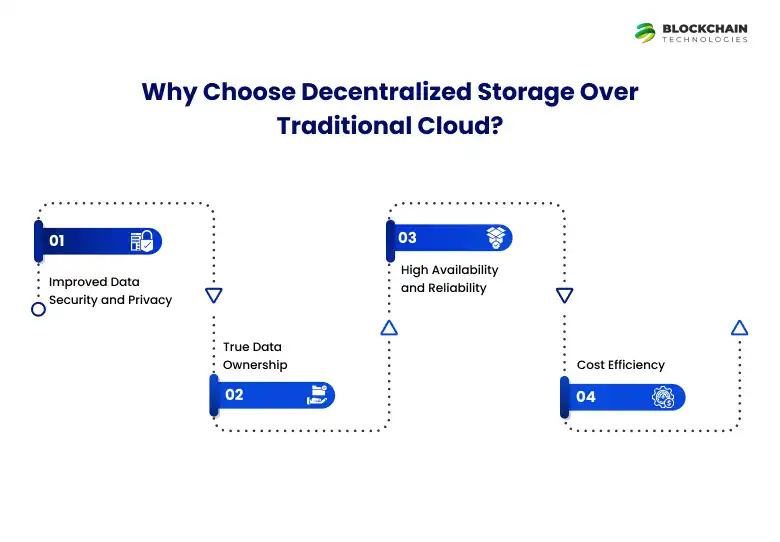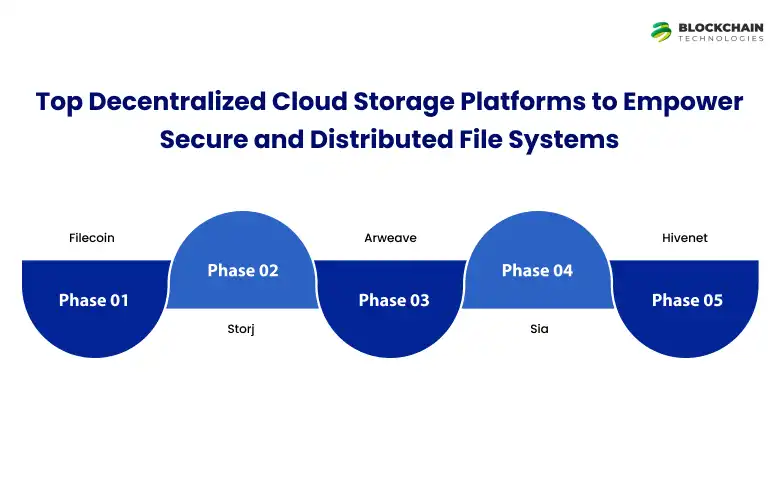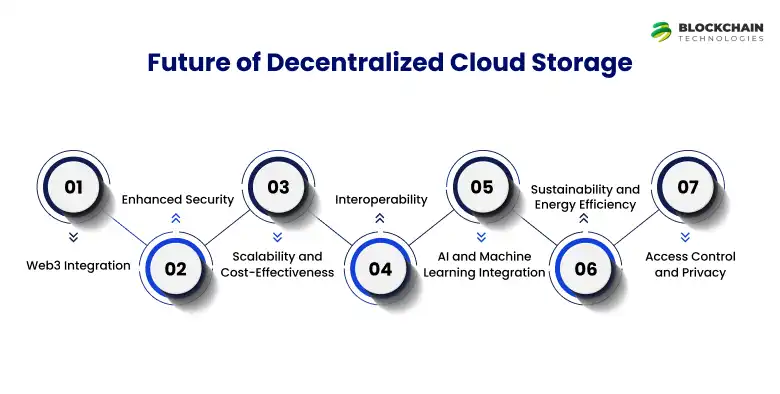Decentralized Cloud Storage Solutions: Empowering Data Security and Accessibility
May 29,2025

In an era where data breaches and centralized control over information are increasingly concerning, decentralized cloud storage emerges as a transformative solution. Unlike traditional cloud storage systems that rely on centralized servers, decentralized storage distributes data across a network of nodes, enhancing security, privacy, and accessibility.
- According to a report by IDC, the global data sphere is expected to reach 175 zettabytes by 2025, a significant increase from previous years. This surge in data generation underscores the need for scalable and secure storage solutions.
- Decentralised cloud storage is projected to grow at a CAGR of 21.3% by 2030, driven by rising concerns over data breaches and centralized server vulnerabilities.
The global decentralized storage market is projected to grow significantly, driven by the demand for secure data storage and the rise of Web3 storage solutions. This shift not only addresses the limitations of centralized systems but also aligns with the growing emphasis on data sovereignty and user control.
This blog post will delve into the workings and benefits of decentralized cloud storage over traditional methods, explore how blockchain enhances data security in cloud storage, and highlight some of the best decentralised cloud storage platforms available today.
Understanding Decentralized Cloud Storage:
Everywhere data breaches, ownership, and accessibility, and decentralized cloud storage is fast becoming the preferred alternative to traditional storage. But what exactly is it, and how does it fit into the next-gen internet?
Let’s break it down, decentralized cloud storage refers to storing data across a network of nodes instead of a single, centralized server. This is where Web3-based data storage solutions shine, offering enhanced control, security, and transparency through the use of blockchain storage solutions and distributed file systems like IPFS (InterPlanetary File System).
What Is Decentralized Cloud Storage and How Does It Work?
Think of traditional cloud storage as putting all your eggs in one basket. Now, imagine if each egg was stored in a different secure location, that’s distributed data storage.
Here’s how decentralised cloud storage works:
The process is largely powered by IPFS, Filecoin, Arweave, and Storj, which are some of the best decentralized cloud storage platforms today.

Understanding Blockchain Protocols: The Building Blocks of DLT
- File Fragmentation: Data is split into chunks or shards, which are then encrypted.
- Distributed Nodes: These encrypted fragments are stored across multiple nodes (computers) on a peer-to-peer network.
- Redundancy and Replication: Each piece is duplicated across several nodes to ensure secure cloud storage and availability even if some nodes go offline.
- Smart Contracts and Blockchain Ledger: Using blockchain-powered file storage systems, transactions like uploading or retrieving files are verified and recorded on an immutable ledger.
- Access via Keys: Only the data owner can reassemble the fragments using private keys, maintaining full control.
Why Choose Decentralized Storage Over Traditional Cloud?
Let’s talk real benefits, not just some myth. Benefits of Decentralized Cloud Storage Over Traditional Methods:

Improved Data Security and Privacy
- No central point of attack, reduces vulnerability to hacks.
- Encryption by default protects data during storage and transit.
- How decentralized storage improves data privacy is evident as even storage providers cannot access user data.
True Data Ownership
- Unlike traditional services where your data may be monetized, Web3 storage platforms return control to the user.
- Perfect for businesses needing decentralized cloud storage for enterprises that require full data sovereignty.
High Availability and Reliability
- Distributed file system ensures uptime with automatic failover.
- Files can be recovered even if several nodes are down.
Cost Efficiency
- Reduced infrastructure costs by renting storage from peers.
- Great for startups and SMEs seeking cost-effective decentralized storage solutions for businesses.
Seeking True Data Ownership?
Take control of your files with decentralized solutions with your data, your rules!
Top Decentralized Cloud Storage Platforms to Empower Secure and Distributed File Systems
As decentralized storage reshapes how we manage digital data, several platforms stand out by offering scalable, secure, and efficient solutions. These decentralized cloud storage platforms provide not just Web3-based data storage solutions, but also enhanced privacy, cost-efficiency, and performance.

Filecoin
Filecoin, built on IPFS, transforms how we store data by introducing a blockchain-driven, incentive-based system. Nodes compete to offer storage and are rewarded with FIL tokens, ensuring active participation and verifiable data redundancy. This decentralized ecosystem is designed for developers who need distributed data storage with tamper-proof verification.
Key Features:
- Built on IPFS protocol for decentralized data referencing
- Proof-of-Replication and Proof-of-Spacetime for storage validation
- Tokenized incentives for node participation
- Scalable storage for large datasets
- Ideal for developers, researchers, and decentralized apps
Storj
High-Performance Decentralized Cloud Storage for Enterprises. Storj enables encrypted, high-speed storage by distributing file shards across a global network of nodes.Each shard is stored redundantly, and access is controlled via private keys, delivering secure cloud storage without central oversight. With S3 compatibility and enterprise integrations, it’s a strong contender for decentralized cloud storage for enterprises.
Key Features:
- AES-256-GCM encryption for file security
- Geo-distributed network for high-speed access
- Open-source and S3 API compatible
- Web3 cloud storage architecture using Storj
- Ideal for media, healthcare, and enterprise backups
Arweave
Arweave is designed for permanence, it stores data forever using a blockchain-like structure called Blockweave. Once uploaded, data cannot be altered or deleted, offering immutable and transparent Web3-based data storage solutions. This is ideal for archival records, public data, NFTs, and other content that demands long-term availability.
Key Features:
- Pay-once, store-forever model
- Immutable record-keeping with Permaweb
- Ideal for NFTs, government records, public archives
- Decentralized verification through Blockweave
- Developer SDKs for seamless integration
Sia
Sia decentralizes the cloud by connecting users with hosts through a smart contract-powered storage marketplace. Users pay with Siacoin, and storage contracts ensure reliability and uptime guarantees, making it ideal for cost-effective decentralized storage solutions for businesses.
With built-in redundancy and encryption, it’s both affordable and secure.
Key Features:
- Decentralized storage contracts with automated payments
- End-to-end encryption for all stored files
- Low-cost alternative to AWS, Google Cloud
- Open-source with API access
- Startup reduced storage cost by 60% with Sia
Hivenet
Hivenet taps into the unused computational power of connected devices to create a distributed and eco-conscious storage network. Data is split, encrypted, and distributed across participants, enhancing secure data storage with zero dependency on centralized servers. Its model aligns with green computing, making it an excellent fit for modern Web3 storage ecosystems.
Key Features:
- Eco-friendly and community-run storage network
- Peer-to-peer file redundancy and encryption
- Real-time access with decentralized validation
- Zero centralized infrastructure dependency
- Suitable for ethical brands and green tech adopters
Web3 is here, don’t let your data stay stuck in Web2
Sunrise Technologies helps you modernize with blockchain storage.
Comparison of the Best Decentralized Cloud Storage Platforms for Secure Data Sharing
Choosing the right decentralized cloud storage solution depends on your specific needs, whether it’s cost-effective decentralized storage solutions for businesses, permanent archival, or high-throughput enterprise access. Below is a technical comparison of the top platforms helping enterprises and developers embrace Web3-based data storage solutions.
Each of these platforms leverages blockchain storage to eliminate reliance on centralized providers like AWS or Google Cloud, empowering users with secure data storage, privacy, and transparency.
| Platform | Storage Mechanism | Consensus/Validation | Encryption & Privacy | Ideal Use Case |
|---|---|---|---|---|
| Filecoin | IPFS-based block storage | Proof-of-Replication, PoSt | End-to-end with verifiable proofs | Decentralized app hosting, research archives |
| Storj | Sharded object storage | Node audit & reputation | AES-256-GCM, private key access | Enterprise-grade secure cloud storage |
| Arweave | Blockweave (permanent) | Succinct Proofs of Random Access | Immutable storage, public access | Archiving, NFT metadata, legal docs |
| Sia | Smart contract-based renting | Contract-based with uptime score | Encrypted segments across nodes | Affordable backup & business storage |
| Hivenet | Peer-powered distributed cloud | Community node validation | Encrypted, sustainable node mesh | Eco-friendly Web3 storage for ethical brands |
Cost Comparison in Decentralized Cloud Storage for Enterprises and Developers
Choosing the right decentralized cloud storage platform means understanding how pricing models, storage architecture, and blockchain-powered file storage systems affect your budget. Here’s a side-by-side comparison of the top secure decentralized storage platforms 2025 based on their cost structure and data access models.
| Platform | Storage Cost (Approx.) | Retrieval Fees | Redundancy Model | Payment Type |
|---|---|---|---|---|
| Filecoin | $0.01–$0.02/GB/month (variable) | Yes (based on bandwidth) | Market-driven replication | FIL Token |
| Storj | $4/TB/month (flat) | $7/TB egress | Erasure coding with 80+ nodes | STORJ Token |
| Sia | $1–$2/TB/month | Minimal, smart contract-based | 3x replication default | SC Token |
| Arweave | $5–$7/GB (one-time, permanent) | None | Permanent single storage | AR Token |
| Hivenet | Community-rated (avg $3–$5/TB/month) | Varies, low-cost | Sustainable replication | HIVE Token |
Cut storage costs, not security.
Ask us how decentralized storage can streamline your IT budget.
Challenges and Solutions in Blockchain Storage for Decentralized Cloud Systems
While blockchain-based cloud storage for enterprises offer revolutionary benefits in data privacy, cost efficiency, and resilience, they also come with technical and logistical challenges. But thanks to rapid innovation in Web3-based data storage solutions and blockchain storage technologies, many of these hurdles are being actively addressed. With robust community support, blockchain upgrades, and enterprise-level integrations, the future of decentralized cloud storage is rapidly evolving to meet even the toughest demands.
Let’s explore some common challenges, and the smart solutions that are shaping the future of secure cloud storage.
Challenge: Ensuring Data Availability in a Distributed File System
In distributed data storage, files are split and stored across many independent nodes. But what if those nodes go offline or are compromised?
Solution:
- Use erasure coding and multi-node redundancy to maintain data integrity.
- Platforms like Storj and Filecoin implement smart contracts that ensure at least 80+ nodes are storing your data.
- Blockchain storage solutions ensure cryptographic proof-of-storage and uptime-based incentivization.
Challenge: Data Privacy and Security in Public Networks
With data distributed across global nodes, concerns about unauthorized access and encryption arise.
Solution:
- Apply client-side encryption before data upload.
- Use zero-knowledge proofs to allow verification without exposing data.
- Secure cloud storage platforms like Sia and Hivenet offer end-to-end encryption and permissioned access layers.
Challenge: Integration with Existing Enterprise Infrastructure
Traditional IT systems are typically centralized, making it hard to switch or integrate with decentralized architecture.
Solution:
- Use hybrid-cloud approaches, combining Web3 storage with traditional cloud APIs.
- Blockchain-powered file storage systems offer SDKs and plugins for platforms like AWS, Google Cloud, etc.
- Decentralized cloud storage for enterprises is becoming more accessible with business-ready APIs.
Challenge: Variable and Complex Pricing Models
Enterprises often struggle to forecast storage costs due to market-based or token-based billing models.
Solution:
- Platforms like Storj offer flat pricing for predictable billing.
- Cost-effective decentralized storage solutions for businesses are being developed with subscription tiers.
- Blockchain tokens can be hedged or prepaid for budget predictability.
Challenge: Network Latency and Retrieval Time
Fetching files from decentralized nodes can take longer than centralized services, affecting performance.
Solution:
- Content Delivery Networks (CDNs) layered with secure data sharing with IPFS decentralized network
- Platforms like Arweave and Hivenet implement local caching and smart routing.
- Implementing IPFS for distributed data storage ensures faster edge-based retrieval.
Real-World Use Cases of Decentralized Cloud Storage in Enterprise and Web3
Decentralized cloud storage is making waves across industries, providing secure, scalable, and cost-efficient solutions for data storage. Blockchain-powered file storage systems offer a wide range of applications, especially in enterprise solutions, Web3 technologies, and beyond. Let’s dive into how Web3-based data storage solutions are reshaping industries.
Healthcare:
So, actually to know, how a healthcare company uses Filecoin for secure medical data sharing is a security revolution. In healthcare, data protection is critical. By leveraging decentralized cloud storage, healthcare providers can securely store patient records with full control over access and privacy. This approach ensures data integrity and prevents unauthorized alterations, offering healthcare organizations the ability to maintain compliance with stringent regulations.
Features:
- HIPAA-compliant storage for secure patient records
- Tamper-proof encryption across decentralized nodes
- Smart contract-driven access control for better data governance
Finance:
Features:
- Immutable transaction logs stored securely on the blockchain
- Real-time data auditing with transparent access
- GDPR and ISO-compliant decentralized storage solutions
Startups & Developers:
For startups and developers, decentralized cloud storage offers a scalable solution to host decentralized applications (dApps), NFTs, and metadata securely and cost-effectively. By leveraging technologies like and Filecoin, developers can store vast amounts of off-chain data while ensuring content availability and data integrity.
Features:
- Integration with Web3 protocols like Ethereum and Solana
- Low-cost, scalable storage for growing dApp ecosystems
- Content-addressing technology ensuring persistent data links
Media & Content Platforms:
Media companies and NFT platforms need secure, long-term storage for digital content. By utilizing Arweave and Filecoin, content creators can ensure that their files are stored permanently, guaranteeing that their digital art and media remain accessible for generations to come.
Features:
- Permanent file storage for digital art and media
- Transparent royalty distribution and content usage logs
- Decentralized storage networks ensuring continuous file accessibility
Global Enterprises: Hybrid Cloud Migration
Large enterprises are increasingly adopting hybrid cloud strategies. By combining traditional cloud services with decentralized cloud storage, they gain enhanced data privacy and operational resilience. This enables them to safeguard critical business data while reducing reliance on centralized data providers.
Features:
- Multi-cloud storage models with decentralized backups
- Enhanced global data availability for distributed teams
- Resilient infrastructure minimizing downtime and data loss
Future of Decentralized Cloud Storage:
The future of decentralized cloud storage is bright, with technological advancements and increasing adoption across various industries. As more businesses and individuals seek greater control over their data, blockchain-powered file storage systems are evolving to meet the demand for scalable, secure, and privacy-focused storage solutions.
Let’s explore the emerging trends and innovations that will shape the future of Web3-based data storage solutions.

Web3 Integration:
The integration of Web3 technologies into cloud storage platforms will transform how individuals and organizations interact with their data. Decentralized cloud storage enables true ownership of digital assets, empowering users to control their data, from NFTs to personal files, without relying on centralized providers. By adopting blockchain storage, data becomes transparent, secure, and auditable.
- Self-sovereign identity (SSI) for data ownership and management
- Decentralized applications (dApps) integrated with Web3 storage solutions
- Smart contracts for automated storage management and data access control
Enhanced Security:
As cyber threats continue to evolve, decentralized cloud storage solutions will adopt advanced encryption algorithms to provide even greater security for stored data. Blockchain storage solutions already offer tamper-proof systems, but with innovations like quantum-resistant encryption and zero-knowledge proofs, data will become more resilient to hacking and unauthorized access.
- Quantum-resistant encryption for future-proof data protection
- Zero-knowledge proofs ensuring privacy while proving data integrity
- End-to-end encryption across all decentralized storage platforms
Scalability and Cost-Effectiveness
In the coming years, decentralized cloud storage will become more scalable and cost-effective, enabling large enterprises to manage vast amounts of data securely. As blockchain storage solutions mature, businesses will benefit from reduced storage costs, as the system removes the need for centralized data centers and optimizes resource allocation across a distributed network.
- Dynamic storage pricing based on usage and availability
- Scalable architecture for handling enterprise-level data needs
- Incentive-driven marketplace for renting unused storage space
Interoperability
One of the key future trends in decentralized cloud storage is improved interoperability across different blockchain platforms. With growing demand for cross-chain applications, platforms like IPFS and Filecoin will enhance their compatibility with various blockchains, allowing seamless data transfer and storage management across networks. This integration will streamline distributed data storage for businesses operating in diverse ecosystems.
- Cross-chain compatibility between multiple blockchain platforms
- Seamless file access across different blockchain networks
- Unified storage systems for multi-chain applications
AI and Machine Learning Integration
Artificial Intelligence (AI) and machine learning (ML) will play a pivotal role in the future of decentralized cloud storage. By incorporating AI into blockchain storage solutions, users can optimize data storage processes, predict storage needs, and improve system performance. AI can also automate the detection of unusual activity, enhancing data privacy and security.
- Predictive analytics for optimized data storage
- AI-powered data governance for better access control
- Machine learning algorithms for anomaly detection in storage networks
Sustainability and Energy Efficiency
Sustainability will be a significant factor in the evolution of decentralized cloud storage. As concerns over data center energy consumption grow, decentralized platforms are focusing on energy-efficient solutions. By leveraging blockchain storage, platforms can optimize energy use across the distributed network, offering more sustainable alternatives to traditional centralized data centers.
- Energy-efficient storage solutions using green technologies
- Sustainable blockchain protocols reducing energy consumption
- Carbon footprint reduction through distributed storage nodes
Access Control and Privacy
As privacy concerns intensify, the use of Decentralized Identifiers (DIDs) will grow in Web3 storage solutions. DIDs allow users to control their personal information and data access rights through self-sovereign identity management, enhancing privacy and security. This approach will enable more secure and private file storage, offering fine-grained access control over sensitive information.
- Self-sovereign identity management for privacy
- Granular access control using blockchain-based identity systems
- Secure data sharing through DIDs for trusted parties
Conclusion: The Future of Data Belongs to Decentralization
As data becomes the lifeblood of the digital economy, decentralized cloud storage emerges as a game-changing solution that champions data privacy, distributed file systems, and secure cloud storage. With the convergence of blockchain storage solutions, IPFS, and Web3 storage, businesses and individuals alike can now enjoy greater control, transparency, and resilience in their data infrastructures. Backed by blockchain development, these technologies are the new foundation of secure and cost-effective decentralized storage solutions for businesses worldwide.
For organizations ready to future-proof their operations, Blockchaintechs.io stands as a top blockchain development company, offering cutting-edge expertise in deploying scalable, blockchain-powered file storage systems tailored for real-world impact. From custom Web3 integrations to enterprise-ready decentralized storage platforms, Sunrise empowers you to take the leap toward next-gen digital transformation with confidence.
Partner with us, and make your data smarter, safer, and unstoppable.
Enterprise data deserves more than just cloud space.
Explore Sunrise’s blockchain storage solutions built for reliability.
FAQs:
The most secure decentralized storage solution is Filecoin combined with IPFS (InterPlanetary File System), as it offers encryption, redundancy, and distributed storage across multiple nodes, ensuring data security and availability.
Blockchain provides immutable records and consensus mechanisms, ensuring data integrity and preventing unauthorized alterations.
IPFS ensures data security through content addressing (using unique cryptographic hashes for data) and encryption (data is optionally encrypted before uploading), preventing unauthorized access and ensuring the integrity of the data.
The cost can vary based on storage needs, platform choice, and integration complexity. However, many solutions offer cost-effective decentralized storage models. For businesses seeking affordable blockchain development, companies like Blockchaintechs.io provide the best blockchain development services, ensuring secure and scalable implementation
Decentralized cloud storage, like IPFS and Filecoin, can be cheaper than AWS or GCP for certain use cases, especially for static data. However, the cost varies based on storage size, retrieval times, and network activity, and may not always match the efficiency of traditional cloud providers.
